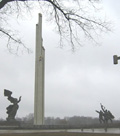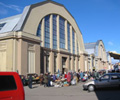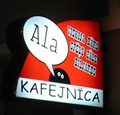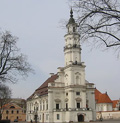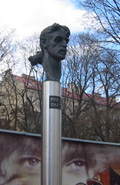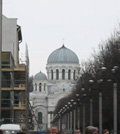| How would you like to view this page? | ||
|
Jump to
Note: the Estonia Guide now has it's own page! See Also:
|
(The guides below are based on the following visits: Riga: Oct 2000 & April 2003; Vilnius: Sept 1998, April 2003 and August 2005; Kaunas: April 2003) |  |
|
Introduction I’ve been lucky enough to have been to the Baltics on four separate occasions so far, and I dearly love this part of the world. However I cannot claim to be an expert in this field, so what follows is merely some suggestions that may give some alternative ideas about what to do, see and drink. Aside from a wide amount of expert knowledge amongst the Tartan Army at large, and the conventional guide books such as Lonely Planet, another excellent source of information for this part of the world exists in the In Your Pocket Guides. |
 |
|
| Latvia is the central Baltic nation, and is the shortest from top to bottom. It is often assumed to sit in the middle of the other two in terms of stereotypes – Estonia and Lithuania form the extremes. One thing to note is the high Russian population – around 47% of the population are ethnically Russian, and indeed they form a majority in the two biggest cities: Riga and Daugavapils. Most of this is the result of the massive population displacements the nation suffered under Soviet rule (visit Riga’s moving occupation museum for a better understanding). As a result, Latvia itself is very exacting with citizenship, and language and history tests have to be passed before it is granted. This has all led to a lot of anti-Russian racism, a backlash of sorts, and a fair bit of tension: you are very unlikely to experience this (unless you are close to Latvians or Russians, or speak either language). |
|
|
| Riga is my favourite of the Baltic capitals as it is just a functional big city with a very pretty centre. By that, I mean it doesn’t care if you are a tourist or not, it just gets on with being what it is, with or without you (this is hard to explain, but I like it!). The action is pretty much centred around the old town, known as Vecriga. Full of narrow, cobbled lanes and red brick churches and buildings, Riga has maintained many links with it’s Hanseatic past. The city celebrated it’s 800th anniversary in 2001, and was European Capital of Culture to celebrate. There are many sights to see, some of which I’ve listed below, and a good way to get your bearing is to take the minibus tour of the city from in front of the Rifleman’s statue (most hotels and the tourist office in the House of the Blackheads has info on this). The Hotel Konventa Seta is very highly recommended – I’ve stayed in all sorts of rooms there on my three visits (standard double, junior suite and suite). All are very spacious (obviously, they get bigger as you go up), and the cleaners are stunning. Radi un Dragi (Friends and Relatives) is also highly recommended – it’s right opposite Dickens Pub. For all mod-cons, use the Radisson SAS – just bear in mind that it’s a long way across the river! |
|
|
|
|
|
As well as the Skyline Bar mentioned above (which is more of a sight anyway – not one for a session!), here are a few more you may wish to consider:
|
|
|
Jurmala Just down the coast from Riga, and practically conjoined to the Riga metropolis, is the gorgeous resort of Jurmala, home to many a retired Soviet colonel. Jurmala is actually a string of several towns joined together along the beach – Majori seems to be where it’s mostly at, and has a Disney-esque main street lined with brightly coloured houses. Head down to the wide golden sandy beach, where there are plenty of facilities, including an amusement park, several bars on the sand itself and changing facilities. Local trains leave regularly from Riga’s main station (just to the south-east of Vecriga) – these are the biggest trains you will ever see! Get off at Majori, where you too can experience the worst Gents toilet I have ever seen – if it hadn’t been for the gnarled old woman charging 15p a go I would have been back in with a camera just to prove it to you! We went on a warm (for the Baltics) September day – you may want to give it a miss if you’re there in February! |
||
Lithuania Lithuania is the least Westernised of the Baltic states (although there are real signs of change), and shares many bonds with neighbouring Poland– not least of which a strong Catholic faith. Sometimes called the “Italians of the Baltics”, the locals have a reputation for being passionate and hot-headed – something I would have to agree with! The local beer available in abundance is Utenos, although there are other brands. The beer is decent enough – a pils taste, although slightly heavier to digest. If you get the chance in either Vilnius or Kaunas to try Avilys – don’t miss it! The normal stuff is top notch, the Ginseng Beer a bit too stoutish, but the Honey Beer is one of the best beers I have ever tasted. The local spirit is mead – “midus” – and comes in a range of potencies, from a respectable 12% to a mindblowing 75% (Absinthe generally clocks in at 70%!). The first time I tried mead was in 1998 – I had just under a fiver worth of Litas left at the airport, so bought a small earthenware Grolsch-style bottle at the airport (green label = 12%, blue = 25%, red = 50% - I chose red). I have never, ever known anything to get 4 grown men drunk so quickly (i.e. just a single shot, after a few beers). The second time I tried mead was in April 2003 – a gift from a drunken, aged skinhead, it was brought to me alight on a silver platter with a bicycle bell (which the waitress was ringing). I managed half the double-shot before the straw melted, and my night came to an abrupt end shortly after. |
|
|
Vilnius Vilnius is just as unique as the other Baltic capitals, and can also boast the largest medieval Old Town in Europe – this led to some early claims of it being “the New Prague” (I first heard them in 1998 on my first visit). By 2005, the tourist infrastructure was certainly improved, even from 2 years previous. The Old Town is very spread out, and is bestowed with wide streets and low buildings – all of this allows a lot of sunlight to hit the brightly painted buildings, making this a much more colourful city than most. The Old Town centres on two elongated Squares (yes, I know they make rectangles) – Didzioji and Vokieciu, joined together to form an “L”, however the most magnificent of the sights is the Cathedral. Standing at the eastern end of Gedimino Prosp, the massive white building stands in it’s own square, and has an unusual stand-alone bell tower around 50 metres away. Legend has it that there is a lucky slab somewhere between the tower and the cathedral’s front door. Immediately behind the Cathedral is Gedaminas Hill, topped by a small fort – climb up here and pay the admission fee for a great view over the old city and of Three Crosses hill.in the other direction. Just down from here is Uzupio, an area with a bohemian reputation but I’ve never been myself. The back-streets between the old town and Uzupio are very atmospheric and well worth exploring. |
|
|
|
As well as Gediminas Hill and the Cathedral (above), other sights include
|
|
|
|
|
|
Kaunas Kaunas is Lithuania’s second city, and is just over an hour’s drive from Vilnius (or two hours if you’re in an A-Team van with a lost Armenian driver!). The centre is pretty small, and is based on a peninsula bordered by two rivers, with the Old Town squeezed right down into the point. To be truthful, the Old Town seemed pretty quiet, although the square and cobbled streets were pleasant enough. The real action was up on the precinct, which has to be the biggest I’ve ever seen! It must stretch for at least 2 miles, right up to a stunning Kremlin-style church. A student town, Kaunas does have several nightlife options, but we were only there for a day (with the match in the evening). No bars stood out as particular favourites, and the service seemed pretty slow in all of them (doubtless caught off guard by a couple of thousand thirsty Scots!), although we met up with most people in the large Metropolis. Special mention to the Cowboy restaurant/bar where we had lunch (in the cobbled street leading down to the precinct) and to the Kaunas branch of Avilys (no Ginseng beer, but plenty of honey!). |
|
|
Text Links: [HOME] [BASICS] [INFO & NEWS] [TRAVEL] [INTERACTIVE] [MEMORIES] [FUN] [NETLEY GUIDE] [TARTAN ARMY] [SITE MAP]
Copyright notice:
All photographs on this site are the property of individual members of
the Netley Abbey Tartan Army unless otherwise stated. The copyright of
these images remains with the individual possessing the photographic negatives,
and permission should ideally be sought before copying them. We are keen
to prevent anyone from making financial gain from our copyrighted images,
or bringing the reputation of the Netley Abbey Tartan Army into disrepute
(as we are more than capable of doing this ourselves).
If anyone does wish to use these images and
would like express written consent to do so, please e-mail Paul Allison
using via the contact page.
© Netley Abbey Tartan Army, 2001-2008
(and beyond...)



